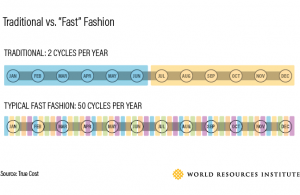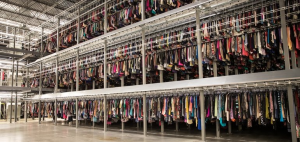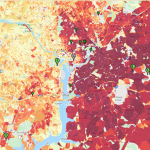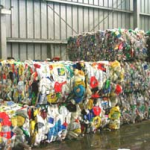Recommerce Rises, Retail Falls in Age of COVID-19
By Erika Skowron, American University
With stay-at-home orders during the COVID-19 pandemic, consumers were left with more spare time than ever before, which led to banana bread baking, DIY home improvement projects, and the inevitable closet cleanouts. Selling and buying clothing through the secondhand market, also known as “recommerce,” became an easy way for people to find an extra source of revenue and purchase previously worn clothing at a cheaper cost. Multiple recommerce platforms, such as ThredUp, Poshmark, and Rendered Inc., provided a convenient, user-friendly experience for consumers from the comfort and safety of the home.
According to GlobalData Market Sizing and Growth Estimates, the secondhand market (which includes resale, traditional thrift stores, and donation) is projected to reach $64 billion by 2024, more than doubling itself from $28 billion in 2019. Comparatively, the retail clothing industry is expected to decrease by 15% between 2019 and 2021.
COVID-19 has not only given us the extra time to think about repurposing old clothes and how we shop, but also the environmental consequences of our commerce decisions. Perhaps, one positive that will stem from the pandemic is the grander consumer behavior shift from excessive consumption to conscious consumerism, leading to less waste and a healthier planet.
Pre COVID-19
Sustainable Shopping
Before the coronavirus outbreak in 2020, sustainable shopping, which includes secondhand apparel, was already gaining immense popularity, driven by conscious consumers in the Gen Z and Millennials generations. When in the market for purchasing apparel, the pre-owned option is the most sustainable with the least environmental impact for the planet. Research conducted by the Waste and Resources Action Program (WRAP) found that lengthening the lifespan of an item of clothing by nine months leads to a 20 to 30 percent decrease in each item’s carbon, water, and waste footprints.
The sustainable shopping movement stems from the awareness in recent years of the negative effects that clothing production, in particular fast fashion, the linear model of producing cheap clothing designed for minimal uses, has on the planet. Fast fashion is a linear model approach of producing cheap clothing designed for minimal uses, creating a multitude of micro fashion seasons, compared to the traditional seasons (Picture below).
 The fashion industry is responsible for 10 percent of annual carbon emissions worldwide. While making clothing, 87 percent of the total fiber used gets sent to the landfill or burned instead of being repurposed. The resource and emission intensive process of clothing production and end-of-life disposal has caught the attention of the Gen Z and Millennials generations, powering the second-hand shopping trend.
The fashion industry is responsible for 10 percent of annual carbon emissions worldwide. While making clothing, 87 percent of the total fiber used gets sent to the landfill or burned instead of being repurposed. The resource and emission intensive process of clothing production and end-of-life disposal has caught the attention of the Gen Z and Millennials generations, powering the second-hand shopping trend.
Recommerce Platforms
Popular recommerce companies include ThredUp, Poshmark, Depop, OfferUp, Rendered Inc., and Mercari. In 2020, OfferUp and ThredUp alone have made tremendous growth.
- OfferUp received $120 million in new funding in March of this year, acquiring competitor letgo, now providing a platform for over 20 million monthly active users to buy and sell second-hand items.
- ThredUp partners with large retailers with their Resale x Retail platforms to create resale platforms for each individual brand. In May 2020, Walmart announced their partnership with ThredUp, launching a resale platform on Walmart’s website with over 750,000 pre-owned items. Some additional brands that have ThredUp partnerships include Macy’s, eBay, Abercrombie & Fitch, Athleta, and Gap.
 Image of a ThredUp Wearhouse
Image of a ThredUp Wearhouse
Retail Already Struggling
The retail industry was already facing hurdles prior to the outbreak, with the rise in e-commerce leaving excess store inventory. According to the U.S. Department of Commerce’s retail sales figures, the retail sector sales fell 52% in March, 89% in April, and 64% in May compared to last year.
During COVID-19
When shelter-in-place orders swept across the country closing nearly all in-person retail stores at the beginning of the pandemic, everyone turned to online shopping. With the state of the economy and rise in unemployment, many were forced to reevaluate their spending habits, leading to the increased interest in secondhand items. Additionally, people began looking for new ways to bring in revenue by selling their items. This combination provided both high demand and a high inventory for resale marketplaces.
Turning to Recommerce
In April 2020, OfferUp published a report sharing that since the pandemic, 71 percent of parents surveyed have become more worried about personal finances. 60 percent of parents have switched where they shop for their children, including to online retailers and online resale marketplaces.
With economic uncertainty, consumers are showing that recommerce is still certain. ThredUp’s 2020 Report found:
- Four out of five consumers said, “when money gets tight”, they either have shopped secondhand or are open to the idea.
- 79 percent of consumers plan to shrink their apparel budget within the next 12 months.
Concerns about Cleanliness
Some concerns arose over the safety of secondhand clothing during the pandemic. With uncertainty of how the virus spread on surfaces, lack of trust in other’s disinfecting and hand washing practices, this legitimate fear deterred consumers from purchasing anything other than the bare necessities.
Looking Forward
Recommerce is solidifying itself a spot in the new normal the coronavirus pandemic has created. With the economic impact of the pandemic, consumer behaviors that formed during 2020 are likely to stick, forming into habits due to the length of these uncertain times. With the state of technology, concerns over humans’ environmental impacts, and tight budgets, online resale marketplaces have never had a better platform to thrive.
Clothing will always be a necessity, but the more sustainable, secondhand options are on the way to becoming mainstream. This shift will help reduce the overall amount of clothing waste that ends up in landfills, bettering the planet for future generations.
Definitions
Recommerce: the process of selling previously owned, new or used products.
Circular economy: is based on three principles: of designing out waste and pollution, keeping products and materials in use, and regenerating natural systems
Fast fashion: linear model of quickly producing inexpensive, trendy clothing designed to mimic catwalk designs and latest trends
Sources:
https://www.thredup.com/resale/#resale-growth
https://www.thredup.com/resale/#consumer-trends
http://www.wrap.org.uk/sites/files/wrap/VoC%20FINAL%20online%202012%2007%2011.pdf
https://www.wri.org/blog/2017/07/apparel-industrys-environmental-impact-6-graphics
https://www.ibtimes.com/what-recommerce-walmart-gets-resale-business-partnering-thredup-2983435
https://www.retaildive.com/news/monthly-retail-sales-from-the-us-commerce-department/574252/
https://about.offerup.com/wp-content/uploads/2020/04/OFFERUP_2020-Recommerce-Report.pdf
https://www.ellenmacarthurfoundation.org/circular-economy/concept
https://www.ibtimes.com/what-recommerce-walmart-gets-resale-business-partnering-thredup-2983435
https://www.greenbiz.com/article/how-covid-19-changing-state-recommerce
https://www.cnbc.com/2020/07/27/the-future-of-retail-amid-covid-19.html
https://www.pymnts.com/news/payment-methods/2020/covid-creates-sellers-market-in-recommerce/
https://www.retaildive.com/news/why-used-clothing-can-survive-the-global-health-crisis/581502/





